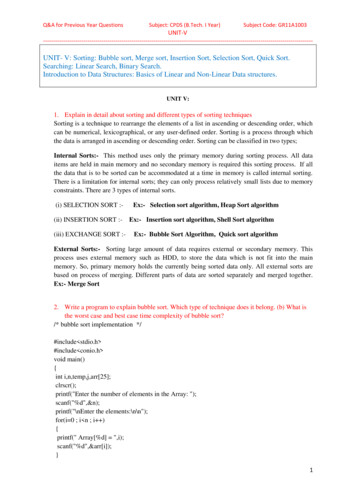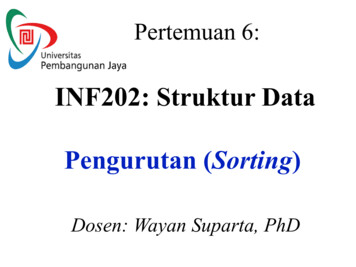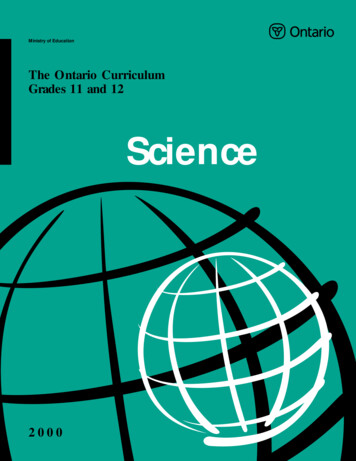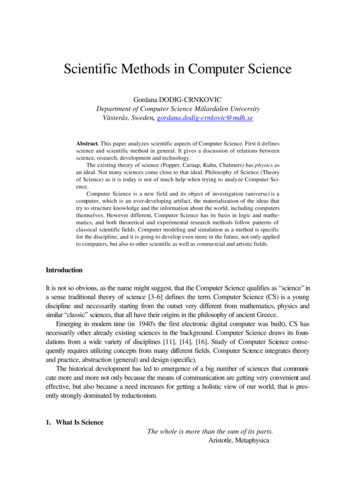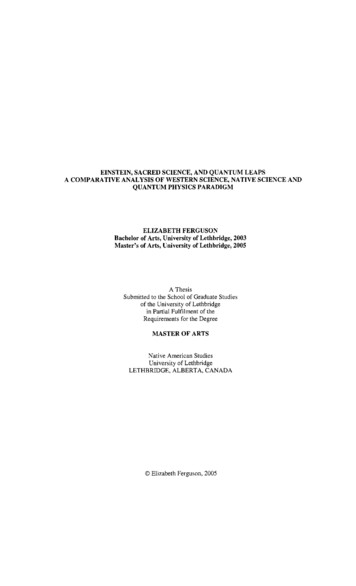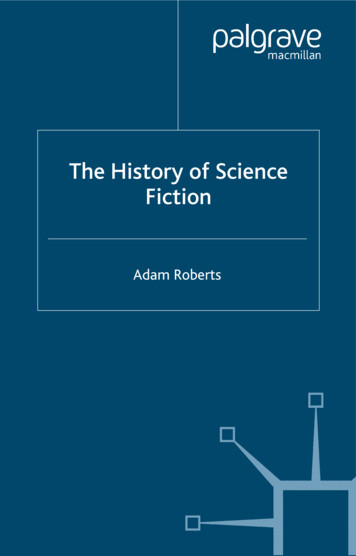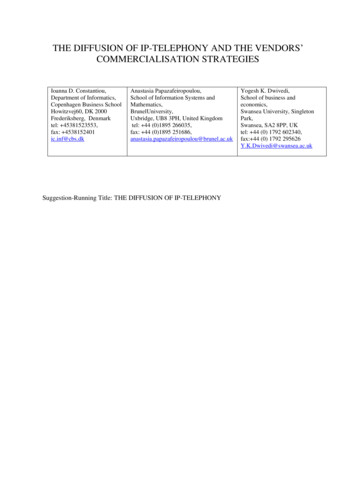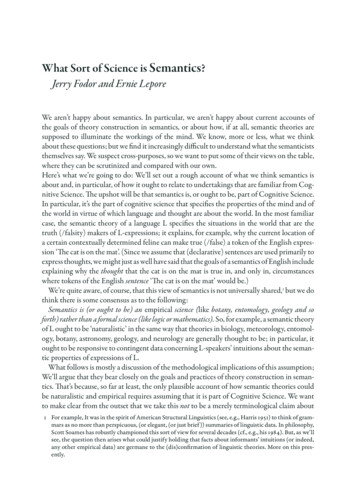
Transcription
What Sort of Science is Semantics?129What Sort of Science is Semantics?Jerry Fodor and Ernie LeporeWe aren’t happy about semantics. In particular, we aren’t happy about current accounts ofthe goals of theory construction in semantics, or about how, if at all, semantic theories aresupposed to illuminate the workings of the mind. We know, more or less, what we thinkabout these questions; but we find it increasingly difficult to understand what the semanticiststhemselves say. We suspect cross-purposes, so we want to put some of their views on the table,where they can be scrutinized and compared with our own.Here’s what we’re going to do: We’ll set out a rough account of what we think semantics isabout and, in particular, of how it ought to relate to undertakings that are familiar from Cognitive Science. The upshot will be that semantics is, or ought to be, part of Cognitive Science.In particular, it’s the part of cognitive science that specifies the properties of the mind and ofthe world in virtue of which language and thought are about the world. In the most familiarcase, the semantic theory of a language L specifies the situations in the world that are thetruth (/falsity) makers of L-expressions; it explains, for example, why the current location ofa certain contextually determined feline can make true (/false) a token of the English expression ‘The cat is on the mat’. (Since we assume that (declarative) sentences are used primarily toexpress thoughts, we might just as well have said that the goals of a semantics of English includeexplaining why the thought that the cat is on the mat is true in, and only in, circumstanceswhere tokens of the English sentence ‘The cat is on the mat’ would be.)We’re quite aware, of course, that this view of semantics is not universally shared,1 but we dothink there is some consensus as to the following:Semantics is (or ought to be) an empirical science (like botany, entomology, geology and soforth) rather than a formal science (like logic or mathematics). So, for example, a semantic theoryof L ought to be ‘naturalistic’ in the same way that theories in biology, meteorology, entomology, botany, astronomy, geology, and neurology are generally thought to be; in particular, itought to be responsive to contingent data concerning L-speakers’ intuitions about the semantic properties of expressions of L.What follows is mostly a discussion of the methodological implications of this assumption;We’ll argue that they bear closely on the goals and practices of theory construction in semantics. That’s because, so far at least, the only plausible account of how semantic theories couldbe naturalistic and empirical requires assuming that it is part of Cognitive Science. We wantto make clear from the outset that we take this not to be a merely terminological claim about1 For example, It was in the spirit of American Structural Linguistics (see, e.g., Harris 1951) to think of grammars as no more than perspicuous, (or elegant, (or just brief )) summaries of linguistic data. In philosophy,Scott Soames has robustly championed this sort of view for several decades (cf., e.g., his 1984). But, as we’llsee, the question then arises what could justify holding that facts about informants’ intuitions (or indeed,any other empirical data) are germane to the (dis)confirmation of linguistic theories. More on this presently.
130Jerry Fodor and Ernie Leporewhat is, or should be, called ‘semantics’; or about exactly how, or exactly where, the bordersbetween linguistics and psychology ought to be drawn. To the contrary, the present questionsare highly substantive; if it’s right to think of semantics as a naturalistic, empirical science,then quite a lot of what linguists, psychologists and philosophers have said about the relationbetween thought and language can’t be true. So, at least, we’re about to try to convince you.To begin with, it bears emphasis that if a theory, any theory, is to be responsive to a bodyof empirical data, it must provide – or at least provide for – an intelligible account of whythose data are germane to the truth or falsity of that theory. If you wish to claim that comingdown with a fever and little pink spots is reliably a symptom of measles, you are in debt for anexplanation of why those symptoms indicate that disease. If you claim that observations of theprecise time at which Mercury is eclipsed by the Sun are data relevant to the (dis)confirmationof theories about the geometry of space-time, you are to that extent, in debt for an explanationof why are. Likewise (to borrow an example from Fred Dretske (1988)) if you claim that thereading of your fuel gauge rs relevant to estimates of how much fuel is left in the tank, you arein need of a story (what we’ll call a ‘bridge theory’) about why it’s relevant. (You can read allabout that in such publications as Fuel Gauges for Dummies (available, no doubt, from Barnesand Noble or Amazon)). And, all else equal, the more articulate and plausible your bridgetheory is, the more you are justified in claiming that your data really do (dis)confirm the theorythat you say that they do. As Dretske observes, what is common to all such examples is thatstates of affairs that are observed ‘carry information’ about states of affairs that aren’t. In thefuel gauge case, we have a pretty good bridge theory explaining why this is so; which is just tosay that we know how fuel gauges work. As Timothy Williamson remarks, “we need a theoryabout the relation between the value of the quantity [that we wish to measure] and the representations of it we record when we use our instruments The scientific investigation [of thequantity] widens to include [the theory of the instruments of observation]]” (2004). Meehland Chronbach got this sort of point exactly right in their classic 1955 paper on the role thatconsiderations of the ‘construct validity’ of test procedures play in the evaluation of empiricaltheories. “Suppose we fail to find a greater incidence of “homosexual signs” in the Rorschachrecords of paranoid patients. Which is more strongly disconfirmed – the Rorschach signs orthe orthodox theory of paranoia? The negative finding shows the bridge between the two tobe undependable, but this is all we can say. The bridge cannot be used unless one end is placedon solider ground. The investigator must decide which end it is best to relocate” (1955, p. 231).All of this continues to apply when the ‘instrument of observation’ is an L-speaker, whoseintuitions about the meaning, reference, propositional content, truth conditions, truth makers, and so forth of L-expressions are the empirical data constraining semantic theories of L.Roughly, (and allowing for differences in terminology), the consensus view is that the semanticproperties of an L-expressions (i.e. the semantic properties that the intuitions of L-speakersare taken to reveal) are determined by the semantic values of L expressions, i.e. by the senses,propositions, functions, or whatever, that linguistic expressions denote or otherwise express.If anything like that is so, we need an (empirical, naturalistic) bridge theory that explains howthe intuitions of L-speakers can carry information about which L-expressions have whichsemantic values. If it belongs to the semantics of English that where the cat is bears on the
What Sort of Science is Semantics?131truth/falsity of tokens of ‘The cat is on the mat’, and if the evidence that it does is that Englishspeakers say that it does, we need a story that makes it plausible that such intuitions are reliable.That is precisely the sort of question that a bridge theory for semantics is required to answer.At the very least, if we don’t have such a theory now, we will have to have one by and by.There’s nothing about this that is peculiar to semantics. What makes the L- speaker’s soidisant ‘intuitions of well-formedness’ germane to (dis)confirming theories about the syntax ofexpressions in L? There is a pretty general consensus that English-speakers have the intuitionthat ‘The cat is on the mat’ is well-formed; and that the fact that they do is part of the evidencefor a linguists claim that it is well-formed. It’s our impression that even linguists who are neutral (or skeptical) about the ‘psychological reality’) of syntax are generally party to this consensus. Accordingly, the questions we’re raising are: Who says that the informant’s ‘well-formednessintuitions’ are, in fact, intuitions of well-formedness? And, even assuming that they are, who gets tosay we are justified in taking the informant intuitions of well-formedness to be reliable? It is, afterall, a methodological truism that being good at doing X doesn’t, in and of itself, justify one’sclaims about how one does X. The informant gets to say what his intuitions are; but not whatthey are intuitions of, or whether they are true. These are typical questions about the constructvalidity of intuitive data in the evaluation of grammars. If there were evidence that having goodlinguistic intuitions about L is a necessary condition for being a competent speaker of L, thatmight justify taking the intuitions of competent L-speakers to constrain linguistic theories ofL. But, to our knowledge, there is no such evidence. To the contrary, there are data suggesting,for example, that children quite generally achieve considerable linguistic competence beforethey come to have linguistic intuitions, reliable or otherwise.We take the issues about the construct validity of intuitive data to be crucial in meta-theoretic discussions of linguistics, semantics included. For example, it is perfectly possible thatsemanticists are just wrong when they say that modal intuitions bear on the (dis)confirmationof their theories. English speakers generally agree that you can’t have killed anyone who isn’tdead; and that they do is widely taken to be evidence that ‘kill’ means cause to die. Likewise, the modal intuition that there is no possible world in which H20 is anything but wateris thought to argue that it’s a linguistic truth that water is H20. But such claims want justifications. Maybe what explains the informant’s intuition that ‘if killed then dead’ is necessary isnot the meaning of ‘kill’ but the metaphysics of killing. In that case, though it is necessary thatkilled entails dead. Nothing follows about whether it is analytic. Rather, what’s wrong withsomeone who doesn’t understand that ‘killed dead’ is necessary isn’t that he doesn’t knowwhat ‘kill’ means; it’s that he doesn’t know what killing is. In fact, many thoroughly reputablephilosophers have been skeptical about ‘truth in virtue of meaning alone’; that is, they havedenied that modal intuitions are intuitions of semantic relations. Quine and Goodman are,surely, about as respectable as philosophers get; but both held that modal intuitions are neithersemantic nor metaphysical but epistemological. Quine took them to be intuitions of theoretical ‘centrality’ (Quine 1951), and Goodman thought them to be intuitions of theoretical‘entrenchment’ (Goodman 1979).Our point in all this is not to revisit old issues about whether modality is a linguistic propertyor whether there is such a thing as analyticity. Our point is just that, if you claim that intuitions
132Jerry Fodor and Ernie Leporeof modality or of analyticity, are germane to the confirmation of semantic theories, you arein need of a bridge theory to explain why it’s right to do so; it can’t be ‘true by stipulation’, or‘true by definition’, that a datum counts for (or against) a theory; not, anyhow, if the theorypurports to be empirical.We’re so sure that getting straight about that is central to understanding how the (dis)confirmation of empirical theories works, that we propose to squander a few more paragraphsrubbing it in; then we’ll consider how it applies to semantic theories in particular.In the bad old days of Operationalism, it was widely held that empirical theories shouldentail their data. That seemed plausible because it was likewise widely held that empiricaltheories must include ‘coordinating definitions’ which connect the ‘theoretical vocabulary’to the vocabulary in which the data are For example, the geologist’s claim that diamond isharder than chalk is confirmed by his observation that diamonds scratch chalk, and not viceversa. That it is follows from the ‘operational definition’ of ‘x is harder than y’, which invokesthe relation ‘x scratches y’ (it’s something like: ‘x is harder than y iff, all else equal, x scratchesy and not vice versa.’) A more sophisticated Operationalism might hold that the scratch testis (not an operational definition of hardness but) a ‘criterion’ for hardness attribution. (Thissort of difference between kinds of operationalist once seemed very important; but it doesn’tany more.)Operationalism was, of course, useful to epistemologists, for whom the refutation of skepticism was what finding the Grail was to King Arthur. The skeptical worry is: because of observational error and the like, even those theories that best conform to the data may not be true. If,however, the connection between the theory and the data is somehow definitional, this worryis incoherent: If ‘is harder then’ means SCRATCHES, the geologist’s inference from the latterto the former is ipso facto philosophically licensed. (Not entirely surprisingly, the view thatgeologists require work-permits from philosophers is more pervasive among philosophersthan among geologists.) Likewise in the case of semantics: if a grammar is by definition a systemization of the L-speaker’s intuitions, then linguists don’t, after all, require a bridge theoryto justify appealing to such intuitions as evidence for (or against) the empirical adequacy ofgrammars. All they need appeal to is the definition.But it turns out (see the previous discussion) that the connection between an empiricaltheory and its confirmation base are generally not sustained by definitions, operational orotherwise. Rather, (as Duhem famously emphasized) the confirmation of an empirical theorytypically recruits a complex of highly substantive assumptions, including highly substantiveassumptions about how the instruments of observation work. These may be drawn from practically any source that seems reliable, including: theories in other sciences, results in engineering, and even thought experiments (to say nothing of brute common sense). It was a matterof dispute among early astronomers what, exactly, telescopic evidence is evidence of canalson Mars? Scratches on the lens?). This dispute wasn’t settled by consulting the definition of‘telescope’; nor could it have been. Meehl and Chronbach were absolutely right.So Operationalism died. So now what? In particular, now what about the relations betweenthe intuitions of L-speakers and the semantics of L? We’ve remarked that many linguists holdthat the goal of semantics is to capture the ‘modal intuitions’ that informants have about ex-
What Sort of Science is Semantics?133pressions in their language; in particular, intuitions about which expressions are entailed bywhich others. Many philosophers say much the same about ‘conceptual analysis’. Thus FrankJackson (1998) writes: “Our subject [in philosophical analysis] is really the elucidation of thepossible situations covered by the words [sic] we use to ask our questions – concerning free action, knowledge, and the relation between the physical and the psychological and whatever ”(p. 33). If that’s true, not much can turn on the difference between what linguists do when theydo semantics and what philosophers do when they analyze concepts.But though they frequently appeal to the semantic values of L-expressions (e.g. to the satisfaction conditions of L-sentences, or the meanings or the ‘uses’ of L-words) to explain themodal intuitions of L-speakers, philosophers and linguists have both been remarkably cavalierabout why it’s alright for them to do so. After all, semantic theories are supposed to be naturalistic explanations of semantic intuitions; and the usual case is that empirical theories explaintheir data by postulating causal interactions between things in the world and instruments ofobservation. But the semantic values that semantic theories typically postulate (propositions,meanings, functions, sets of worlds and the like) don’t have causal powers; they don’t make thingshappen. A fortiori, they don’t cause speakers to have grammatical intuitions. Why, then, is itall right to assume that the grammatical intuitions of speakers bear on the evaluation of grammatical theories; and why don’t philosophers and linguists worry about that?To put the point in a nutshell, lacking a credible bridge theory, the relation between semantics and speaker-intuitions does not seem to conform to familiar patterns of empiricalexplanation. That’s because, on the one hand, the sorts of semantic values that semantic theories take L-expressions to have, aren’t causal properties; a fortiori, they can’t figure in causalexplanations of linguistic intuitions. So, if the grammatical intuitions of competent speakersare to constitute data for semantic theories to explain, we need some sort of account of how thegrammatical intuitions arise from linguistic competence (or, conceivably, vice versa); and, unless grammars are psychologically real, we don’t have one. Why don’t linguists and philosophersworry about this? Why don’t they spend long days and nights trying to construct a bridgetheory about how it could be that semantic facts explain linguistic intuitions?Perhaps, it’s because they think they already know how. True enough, propositions, meanings and the like don’t make things happen, but propositional attitudes do. The propositionthat the cat is on the mat is causally inert, but John’s believing that the cat is on the mat cancontribute causally to determining what else he believes and what he is disposed to do. Thatbeing so, maybe we don’t, after all, need a bridge theory for semantics in order to make itbona fide empirical. All we need assume is that L-speakers believe that L-expressions have thesemantic values that a correct semantic theory for English says that they do (a kind of beliefthat L-speakers might be supposed to pick up when they learn to speak L). If a correct semantics for English says that the proposition that the cat is on the mat is the semantic value of theexpression, ‘The cat is on the mat’, it just follows that that English speakers generally believe thatthe semantic value of ‘The cat is on the mat’ is the proposition that the cat is on the mat. And,unlike propositions, facts about what people believe do make things happen. For example it’sperfectly ok for John’s believing that the cat is on the mat to contribute causally to John’s sayingthat that’s where the cat is, should the question arise.
134Jerry Fodor and Ernie LeporeBut, on second thought, that won’t do. If it is a puzzle how propositions could cause intuitions, it is likewise a puzzle how propositions could cause beliefs. After all intuitions just arebeliefs; having the intuition that ‘The cat is on the mat’ means that the cat is on the mat just ishaving the belief that ‘The cat is on the mat’ means that the cat is on the mat. If there’s a puzzleabout the second, there must be the same puzzle about the first,Bear in mind that we’re looking for a defense of the claim that speaker-intuitions are germane to the (dis)confirmation of semantic theories. Well, for those purposes, to take it forgranted that the intuitions that speaker’s pick up when they learn L are intuitions of meaningwould be to argue in a circle. If we just stipulate that semantic theories are about the meaningsof expressions, we can’t also just stipulate that speaker intuitions bear on the confirmation ofsemantic theories. It’s no use explaining the informant’s intuitions about modality by adverting to his beliefs about modality since, if a bridge theory is required to explain either, then itis likewise required to explain the other. So we’re back where we started; all this dog catchesis its own tail.That’s one reason why mentalistic bridge theories so often strike one as question- begging(much as Quine warned that they would). But we want to emphasize that what’s worrying usis not what worried Quine. As far as we can tell, Quine thought that explanations involving attributions of propositional attitudes are suspect in and of themselves. Propositional attitudesare creatures of darkness; you won’t find them in first-class conceptual systems. By contrast, wehave no quarrel with propositional attitudes per se; some of our best friends have them. Whatwe’re worried about is propositional attitudes about things that lack causal powers.Why We Think Semantics had Better be a Branch ofCognitive ScienceThe proposal is simple and it’s nothing new: To claim that semantics is a branch of cognitivescience is to claim that the semantic properties of propositions of linguistic expressions arementally represented by linguistically competent speakers, and that such representations areetiologically involved in the formation of a competent speakers linguistic intuitions. That ‘cat’expresses the concept CAT (and hence, cats belong to the extension of that concept) is oneof the things that English speakers know about English. Concepts are, of course, abstracta, sothey have no causal powers. But mental representations of concepts are concrete, so they do.The tokening (‘in your head’ presumably) of a representation of a concept is like the tokeningof an English sentence-type. Both such events have causes, and both make things happen. Ouruttering ‘Stop that!’ may cause you to stop that; and, if it does, part of the story about why itdoes is that, qua English speakers, we are disposed to mentally represent tokens of ‘Stop that!’as meaning stop that.If you want the sorts of things that semanticists talk about to be the sorts of things that docausal work, they had better not be abstract objects. Mere common sense takes us that far.
What Sort of Science is Semantics?135Cognitive science adds that, all else equal, our intending to utter a token of the ‘Stop that’type involves my mentally representing the intended utterance as a token of the ‘Stop that’type; and that, all else equal, your hearing an utterance of the ‘Stop that’-type disposes you tomentally represent the utterance as a intended to be a token of the stop that type; and yourunderstanding why we said that we had that intention. Cognitive science adds the thesis thatmental states and processes are causal chains of tokenings of propositional attitude types, andit adds that the links of such chains are tokens of mental representations.Short form: Many linguists and philosophers think that the thesis that the semantic properties of linguistic forms are mentally represented by speakers is a sort of optional add-on inunderstanding semantic theories. They claim, in effect, that you can psychologize linguistics ifyou are so inclined, but that understanding how linguistic explanations work doesn’t requirethat you do. We think that’s just plain wrong. If linguistic data include speaker intuitions, acoherent bridge theory for linguistics requires that grammars be internally represented; otherwise it is simply a mystery why linguistic intuitions are data for semantic theories.We’re aware, however, that we’ve been arguing quite a narrow case. For, suppose we’re rightto claim that you can use intuitive data to (dis)confirm semantic theories if you assume thatlinguistic intuitions are effects that are caused by mental representations of grammars. Thatwouldn’t show that, even in principle, semantic theories are naturalistic or empirical; whetherthey are would then depend on whether theory of mental representation can themselves benaturalistic and empiricistic. Perhaps, it goes without saying that whether they can is not aquestion to which decisive answers are currently available. Representation, mental or otherwise, is itself a semantic notion; so no wonder that so many linguists and philosophers suspectexplanations of semantic facts that depend on assumptions about mental representations arebound to end in circularity.But, in fact, grammars had better be mentally represented whether or not mental representation can itself be naturalized. After all, nobody really knows what naturalization amountsto, or whether a respectable metaphysics demands it of respectable scientific theories. But,metaphysics to one side, it can’t be a miracle that speakers have intuitions about the grammaticality, modality, and so forth of expressions in their language; and it can’t be a miracle that,by and large, such intuitions are accurate. We don’t know how to explain such facts withoutassuming that informants mentally represent the grammar of their language, and that mentalrepresentations play a critical role in the etiology their intuitions. Nor, as far as we can tell, nordoes anybody else. To repeat just once again, questions about construct validity are not a priori,and they must not be begged. That’s one of the reasons that science is so hard.
136Jerry Fodor and Ernie LeporeA Brief Appendix on What Chomsky Has Been Saying of Late2We suppose it’s clear that discussion in the body of this paper presupposes a Realist view ofnotions like ‘mental content’, ‘intentional content,’ ‘mental representation’ and the like. Afterall, the main line of argument has been that you need such notions if you’re to make senseof the traditional linguistic practiced of taking informant intuitions as germane to the (dis)confirmation of grammars; whereas Chomsky’s current view seems to be a sort of Operationalism about the cluster of notions that circle around. They come is as facon de parler. But theyaren’t to be taken with full scientific seriousness. In the long run, precision and disambiguation will require their replacement by a technical vocabulary that dispenses with notions likemental content and mental representations with one that is explicitly not intentional. “Onemay, if one likes, say that I-Language [roughly, whatever it is that the speaker knows abouthis first language in virtue of which he is able to speak it ] but this [usage] merely points tothe problems to be investigated and should not be misinterpreted as a substantive proposal”.Now, we are elderly and feeble chaps, and shocks are bad for us; and we simply can’t get itthrough our head that Chomsky has joined forces with the likes of Dennett, the Churchlands,Skinner and Quine at his most Positivistic. In fact, irony of ironies, we had thought one ofthe things we had learned from Chomsky is that you just can’t have a serious psychology (orlinguistics) that isn’t fragrantly committed to intentional notions, ‘mental representation’ being very much among them.We’re too old to go through that all again; but let us recall a famous point of Frege’s: Ordinary, everyday, talk about the mind is intentional through and through in the (we should havethought) reasonably precise sense that substitution of co-referents fails to preserve truth inthe scope of many of our ordinary, every day psychological terms: ‘John believes that Cicerowas fat’ and ‘John believes Tully was skinny’ may both be true, even though Cicero and Tullywere the same Roman. This does rather suggest that intentionality is rampant in our quotidian understanding of the mental. Moreover, there is a direct (if not mandatory) route fromIntentional Realism to Realism about mental representation, the key idea of which is that,though Cicero is the very same person as Cicero, representing that person as Cicero is not thesame as representing that person as Tully; so it is perfectly possible to do the first but not dothe second. It bears remarking on that this pattern of explanation runs throughout the wholeof the cognitive/perceptual psychology that we’ve actually got. ‘Subjects see the thing as aduck’ and ‘Subjects see the thing as a rabbit’ can both be true even if it’s the very same thingboth times. The standard view is, of course, that ‘seeing as ’ is intentional.It seems to us that faced with these sorts of considerations; Chomsky has two options,neither of which is digestible.1. Rule out intentional psychological explanations by brute fiat and accept the consequent loss of explanatory power.2 One of the things Chomsky has been saying of late is that there’s no fundamental difference between whathe says now and what he’s always said. We think he’s quite wrong about that; but the question is merelyhermeneutic, and we don’t propose to discuss it here.
What Sort of Science is Semantics?137That’s the strategy that Skinner tried in regard to the mental; without, we think, much luck.2. Try to reduce the intentional to the biological/neural (assuming that the biologicalneural vocabulary isn’t itself intentional). Sometimes it seems to us that this is whatChomsky now has in mind.So far, however, this strategy has met with no successes either. In fact, things seem to be goingthe other way. Neurological texts are up to the ears in functional/teleological explanations.And functional/teleological vocabulary is (as far as anyone knows) also up to its ears in intentionality. Neurological explanation rejoices in such explanations as ‘because it functionsto maintain metabolic stability’ and ‘because it sharpens the retinal image.’ So far, there is noground for supposing they are eliminable salve explanatory power. (Many people think thatDarwin showed how to reduce teleology to ‘selection for ‘It turns out, however, that ‘selectfor is intentional to. (See Fodor and Piatelli (2011).)For better or worse, intentionality is the mark of the mental; there seems to be no way toavoid it; and what cannot be avoided, one just has to live with.AcknowledgementsProfessor Gerhard Preyer has been an inspiration (and, at least to Lepore, a great friend) foryears now. His contribut
Semantics is (or ought to be) an empirical science (like botany, entomology, geology and so forth) rather than a formal science (like logic or mathematics). . about that in such publications as Fuel Gauges for Dummies (available, no doubt, from Barnes and Noble or Amazon)). And, all

